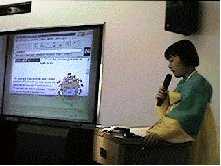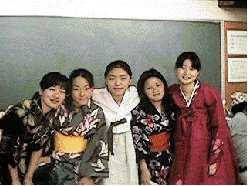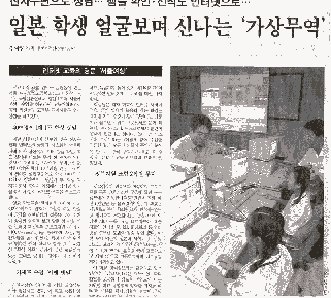Conference to introduce results from the 100-School Networking Project (Phase
II)
Theme meeting
What We Learned through International Exchange
Makoto Kageto, Seiryo Commercial High School
e-mail:kageto@nagoya-seiryo-chs.nishi.nagoya.jp
http://202.249.160.2/kageto.html
1. Introduction
- Five years ago, in order to send e-mail overseas, I had to connect a DOS
machine to an extension telephone. I would have students write letters on
paper, type them in for them, and then send them using a phone line. The communication
process was very slow. Thinking back, I doubt the lesson was particularly
effective. Most often, I simply pointed out student errors and had them rewrite
their letters.
Now, each student has his or her own mail account and is given free access
to e-mail after school. This came to pass because our school became a participant
in the 100-School Networking Project. As a member of this project, and due
to memories of bitter experiences, we chose to focus on international communications.
Our school is a commercial high school. Few students are confident in their
English skills. But many of the students graduating this spring gained self-confidence
in their English skills by using the Internet and passing the English step
test. I would like to report on a number of activities that represent our
various school projects.
2. A project to communicate with high school students in Asia via the Internet
(CEC-initiative project for internationalization)
2.1 Purpose
- Communicate with students from other countries using English, the second
language for people in Asia.
- Communicate with other students using the various capabilities of the Internet
(e-mail, mailing list, and CU-SeeMe).
- Learn more about each culture through correspondence, and to come to understand
what it means to be Japanese.
- Changing student impressions
The Asia they've learned about from textbooks ®
The Asia they came to know through the communication
The English they learned ® practical English
for communication
Nominal internationalization ® Real internationalization
2.2 Content (mailing list—communication—symposium in Japan—increased
communication and cooperative lessons)
(1) Participating schools
 Seiryo Commercial
High School
Seiryo Commercial
High School
Nanzan Kokusai High School
Suzuhari Elementary School (participant in the 100-School Networking Project)
Nakamura High School
Taki High School
Aichishukutoku Senior High School
Okazaki Johsei High School
Nagoya City Midori High School
Meito Senior High School
*Yokkaichi Commercial High School*
Komaki High School
Junior and Senior High School attached to Nagoya Women's University
(participant in the School Net Study Group)
*Kyotanabe City Board of Education*
*Hiroshima Prefecture's Motomachi High School*
and others
(2) Participating schools overseas
- Nepal, Holy Garden High School
- Korea, Seoul Girl's Commercial High School
- Thailand, through a student studying Japanese, whom we knew.
(3) Activities
 Selecting
a theme
Selecting
a theme
Selecting themes using e-mail and mailing lists, we chose themes such as "environmental
problems" and "energy."
- Use of English
We decided to use English as the common language for symposiums held in Hiroshima
and Nagoya. The English spoken by the participating students was comparatively
easy to understand, as they didn't use the contractions used more often by
native English speakers. When we communicate with people from Asia, both sides
carry the burden of speaking a foreign language. For this reason, I expected
that students on both sides would be more relaxed and use English actively.
Students are engaged in active correspondence, in English, with students from
other nations on the mailing list.
- Symposium contents
Students introduced their own schools and countries, presented information
on current conditions in their country, including environmental problems,
then discussed the issues raised. We prepared a handout in English so that
students could better understand each others' presentations.
Pictures and computers were used during the presentations to improve comprehension.
- Using the activities in regular lessons
Using the Internet, we taught a lesson on international trade.
We set up a virtual retail block, where students could browse products and
order them via the Internet. (Related URL: http://202.249.160.2/kageto/trade/trade.htm)
To experience different uses for the Internet, students "exchanged"
product samples using CU-SeeMe. So far, this activity has been conducted only
between two schools. Once a better foundation is established for the lesson,
we will expand it into a cooperative lesson among groups.
3. Student impressions 
- Hi, all friends.
I am having a good time in this travel. I have to say it first, sorry. "Thank
you for your kindness."
We had face to face meeting this time, before, we met only moniter. It's my
glory. It was very good experiences. Also I want to continue communication
by anything. I can't forget all of you. Never, never... And I am missing you
very much. Well, let's make our friendship forever. Have a good night.
- Moon Yun-seung
"Hello. My name is Kuldeep. What is your name?"
Kuldeep wrote this in Japanese. From him, I learned the importance of looking
ahead and pursuing new things—and the importance of knowing and understanding
your past. In his society, he accepts tradition and holds it in high regard,
cultivating an outlook that's less common in Japan these days.
4. Conclusion
- Students' awareness changed as follows:
Primary reasons for learning English
63 students (Surveyed by the School Net Study Group)
- (1) Because it's a subject we are supposed to learn in school.
(2) Because it's necessary for employment and college entrance exams.
(3) Because I want to be able to communicate with foreigners.
(4) Because I'm interested in English.
(5) To become more cultivated.
(6) To become more cosmopolitan.
(7) To collect information from all over the world.
(8) So that I won't be at a loss when I travel abroad.
(9) Others
-
| |
(1)
|
(2)
|
(3)
|
(4)
|
(5)
|
(6)
|
(7)
|
(8)
|
(9)
|
|
Before
|
18.1
|
12.5
|
26.4
|
2.8
|
4.2
|
13.9
|
8.3
|
8.3
|
5.6
|
|
After
|
10.5
|
10.5
|
47.4
|
0
|
0
|
10.5
|
5.3
|
5.3
|
10.6
|
We also polled students who participated in the trading simulation sponsored
by Seiryo Commercial High School for their impressions. The results show that
student understanding and affinity toward Korea changed dramatically as a
result of the lesson.
Understanding: 4 ® 8
Affinity: 5 ® 9
The project greatly changed student awareness.
A student's impression: "I feel more familiar with Korea since I participated
in the project. It feels as though Moon, a Korean student, lives in a neighboring
prefecture, because I can see her anytime with CU-SeeMe."
5. Related URL
- http://202.249.160.2/asia http://202.249.160.2/kageto/trade/trade.htm
Yasuda Women's college: Report on communications in Hiroshima
http://next1.yasuda-u.ac.jp/cranes97/index-sjis.html
 Conference to introduce results from the 100-School Networking Project (Phase II)
Conference to introduce results from the 100-School Networking Project (Phase II)
 Seiryo Commercial
High School
Seiryo Commercial
High School  Selecting
a theme
Selecting
a theme
 Conference to introduce results from the 100-School Networking Project (Phase II)
Conference to introduce results from the 100-School Networking Project (Phase II)